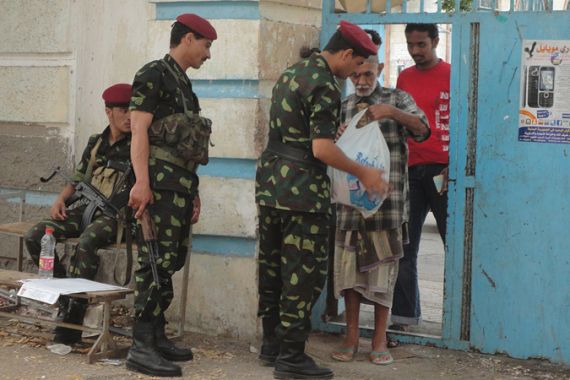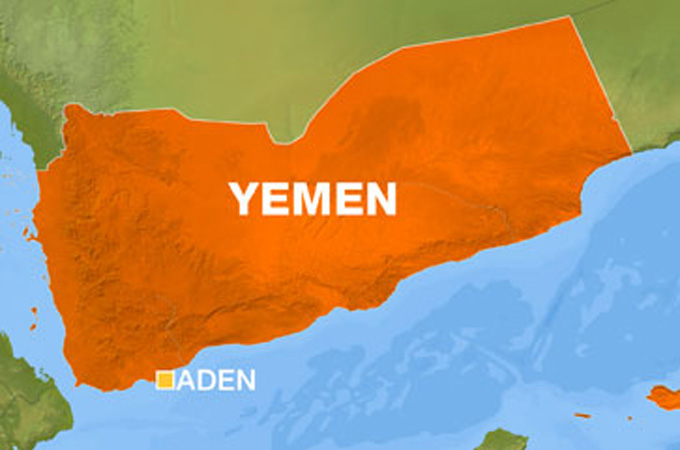Fears temper south Yemen’s election-day hopes
Many in the once independent region remain sceptical as the nation votes to end the 33-year presidency of Saleh.

 |
| A soldier stands guard in front of a campaign poster of the sole presidential candidate, Abd-Rabbu Mansour Hadi [EPA] |
“How is Mansoura?” I asked
“It’s crashing, crashing around me,” came the reply from my brave friend, who had decided to spend election day with his children in the basement of his home in the Aden neighbourhood.
In my own apartment in south Yemen, the smell of gunpowder lingered.
Similar stories resounded from around the south on Tuesday. The day should have been a day to hear celebrations of the first election in 33 years.
Instead bazookas, RPGs, Kalashnikovs and bombs punctured the Aden morning quiet.
Where barbers, fishmongers and qat markets usually performed their daily bustle, burning tyres illuminated the South Yemen flags and roadblocks that reminded people where they were, and who was in charge.
Villagers have not been spared the violence; the reduced number of polling stations has made violence more concentrated. Old tribal divides have resurfaced through the electoral debate within the well-armed rural population.
Reports from Abyan, however, indicated a quieter but more menacing threat. The same level of gunfire had not been heard, but this was because Al-Qaeda in the Arabian Peninsula rules Abyan with an iron fist. They do not require the same dramatics as the Southern Movement to remind people that voting is not an option.
Taiz, also in the south, unsurprisingly told a completely different story. Yemen’s most populous city had to fly in more voting slips as residents of the Youth Revolution’s spiritual home came out in unexpected force.
In most of the south, though, the rush to have an election came at the cost of organisational capacity to ensure public safety. In Aden there was only one location where northerners could cast their vote.
Residents nervous
The visible crackdown on movement and protests by government troops performing road checks and occupying strategic sniper positions, left some residents feeling more nervous than safe, and it only prompted the Southern Movement to crank up its activities.
Over the past week, with each new government road check, there had been an election-station attack, and so the antagonism perpetuated.
The Southern Movement has been fighting for independence from the North in different forms since Yemen’s unification in 1990.
 |
This has taken the form of street protests since 2007. Some would argue it laid ground for the youth revolution.
However, it was the youth revolution that reinvigorated these secessionist protesters, and in 2011 they took to the streets together in unprecedented levels.
It was a poor match, however, and it seems the youth revolution’s partial success has brought with it some foes.
The Southern Movement has abhorred the Youth Revolution’s acceptance of Tuesday’s vote.
The movement only sees it as the legitimisation and extension of the previous regime. It is not hard to see why: the only candidate in the election is Abd-Rabbu Mansour Hadi, the long-serving Yemeni vice-president.
Reports of Saleh returning after the election have not helped their allay their fears, and this week has seen Youth Revolutionary tents being burnt down, allegedly by the Southern Movement.
The overwhelming mass support for the Southern Movement is most evident in Aden, with its strategically important, oil-rich, post-British colonial port now operated by Dubai.
Up to 11 per cent of the seaborne petroleum precariously floats through its gulf, and this does not go unnoticed by the factions vying for its control.
Southern pride
Huge painted South Yemen flags illuminate the shattered walls and old British colonial buildings. Large murals and posters cover innumerable frontages, depicting somber pictures of “our fallen sons”.
Markets are impregnated with makeshift museums. In one, a picture of a young Queen Elizabeth visiting her colony looks over the horrifying photos of children killed in US drone raids and of “our sons” killed in protests and battles.
There is no starker reminder to the West that its unrestrained attacks meant for al-Qaeda will always be laced with a concomitant strengthening of the radical cause and resonance within the population they inhabit.
Despite the risk to their lives, their substantial contingent was adamant they would exercise their democratic right. However, they were truly risking their lives. Death-threat leaflets had been widely distributed in the cities of Aden, Abyan and villages throughout the South.
Despite this evident risk, Maher, a young, educated northerner living in the south, made a stand: “There is a real choice: we can choose peace [with Hadi’s unity government] or we can choose war. How could I not vote?”
President Hadi’s brief will be to lead an inclusive transitional government that coalesces the disparate demands and needs of Yemen’s fractional politics.
Unfortunately, so many of these fractions exist for a reason. Generational tribal disputes dictate local politics in the villages and mountains; Islamist ideology controls much of the Abyan governorate and is growing; the North needs the South’s oil and industry; and the South wants to end two decades of occupation.
For many, the election represents too little too late. The Arab Spring has awakened them to their own causes and now there is no way back.
Muaad, a student in Aden, explained why he would never be convinced to vote for a northern government. “My father died in the war fighting for the south,” he says.
“Betraying him is not a choice.”
His belief and reasons are all too common, and with every additional year of conflict and political wrangling, the vehemence and the body count rise.
Del Newman works for a non-governmental organisation in South Yemen.